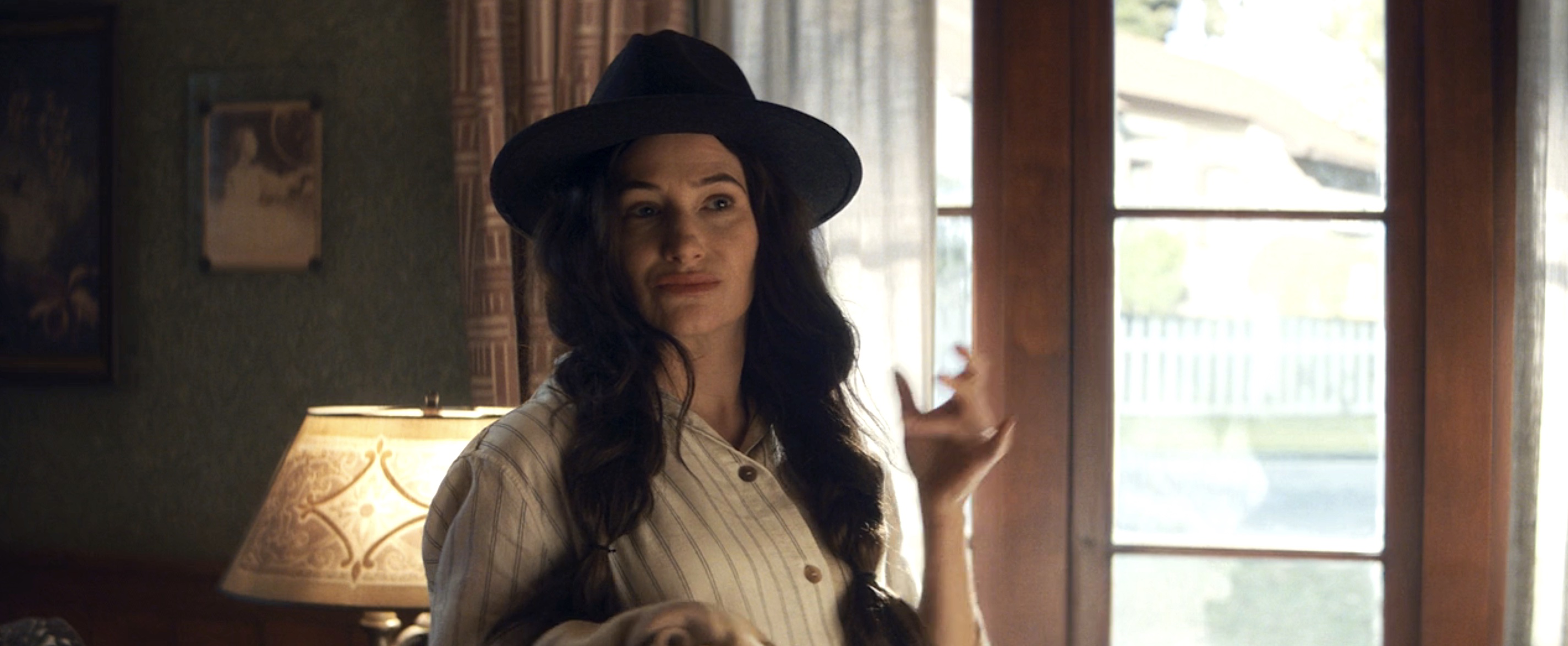
Episode 6 of Disney Plus’ MCU show Agatha All Along answers a lot of questions, or confirms answers we already had: Why Teen tried to rob Agatha’s house in the opening episode, who he really is (it’s pretty much what we thought, but now we know how it happened), why he started studying witchcraft, what Agatha’s “trapped in a police procedural illusion” situation looked like to people outside that illusion, and a whole lot more. But one mystery “Familiar by Thy Side” just deepens is the question of who Agatha really is at heart — and why she cannot seem to stop poking the bear, no matter who the bear is in a given episode.
For all the episodic-adventure focus of the Witches’ Road, Agatha All Along’s real focus seems to be on Agatha (Kathryn Hahn) navigating the question of who she really is, after three years under the Scarlet Witch’s spell, and a lifetime under legends and rumors that control what her fellow witches expect her to be. She’s a lot of different people over the course of these six episodes, by design. She’s brash and dismissive toward most mere mortals, but she shows flashes of vulnerability and tenderness toward Teen (Joe Locke), and grief over her missing child and her mother’s long-standing rejection. She might authentically love (or at least share echoes of a former lust with) Rio, Aubrey Plaza’s mysterious Green Witch character.
Most of the time, though, Agatha falls somewhere between belligerent and cocksure, swaggering in a way that sometimes seems authentically arrogant and sometimes like a thin veneer she throws over her fears and insecurities. Hahn plays her like a series of constantly shifting fronts over an insecure core, and like a survivor who’s willing to be whatever she has to be to keep the wolves (or witches) away from her door.
But the way Agatha keeps taking offensive tacks in dangerous situations — the way she just can’t seem to let herself back down when she should — may be the most telling route into understanding who she is. In “Familiar by Thy Side,” that aspect of her personality is more foregrounded than ever. And particularly given what Teen did to her in episode 5, her attitude in episode 6 lays out the parts of her personality she most needs to contend with if she wants to be around for a second season.
[Ed. note: Spoilers ahead for Agatha All Along through episode 6.]

At the end of episode 5, “Wake Thy Power,” Teen — aka William Kaplan, aka Billy Maximoff — responds to Agatha lethally draining Alice’s power by self-righteously proclaiming that he’s never going to be the kind of witch who kills people to serve his own agenda. Then he promptly attempts to kill Agatha, Jen (Sasheer Zamata), and Lilia (Patti LuPone) to serve his own agenda. But when Agatha pulls herself out of the consuming liquid mud he threw her into, she doesn’t take Billy to task for his hypocrisy, flatter him, try to play on his guilt over Jen and Lilia, or offer to help him understand and refine his newfound power — any of the tactics a smart manipulator might use to get him under her control.
Instead, she needles him about the “fresh body” he’s in. She mocks his lack of control over his power. She speaks disparagingly about his mother Wanda (Elizabeth Olsen), his father Vision (Paul Bettany), and his missing brother Tommy, whose name she gets wrong. She casually assumes she and Billy are still a team, and continues to treat him like he’s still a clumsy kid, even though just minutes ago, he lost his temper and made a credible attempt to murder her. She is, in other words, annoying, provoking, and snide.
That behavior gels with a tactic she’s used throughout Agatha All Along. Robbed of her power and dependent on other people, she’s rarely in control of whatever situation she’s in, and she compensates with smugness, superiority, and what seems to be a well-practiced habit of pushing other people’s buttons. But it’s particularly notable how often that button-pushing doesn’t seem particularly calculated, clever, or thought-through — she’s just saying whatever comes to mind, sometimes switching tactics mid-stream, as she does with Billy in episodes 5 and 6, or with her makeshift coven throughout the first two episodes.

There are a few obvious reasons for that behavior. One is purely psychological: All the hints about her backstory suggest someone who’s in pain, but who thinks showing pain means showing weakness. The rumors that she sacrificed her son for power or killed all her previous partners on the Witches’ Road help keep people afraid of her and afraid of testing her power. She has to see that as an advantage — but the same reputation also keeps everyone at a distance, which has clearly left her lonely. Continuing to push people’s limits and make herself unpleasant feels like a form of defensiveness, a way of pushing people away and making sure they reject her on her terms, not theirs.
But there’s a more practical aspect, as well. For someone who absorbs the powers of witches who attack her, the habit of getting people to attack her may be well-ingrained. She doesn’t admit that when she verbally assaults Billy in episode 6, she’s hoping he’ll blast her so she can absorb and steal his power, the way she admits that’s what she was trying to do by baiting Jen, Lilia, and the others in episode 2 as the Salem Seven witches were breaking down her doors. Sneering at Billy seems more like a reflex — someone he’s already shunned letting him see that she doesn’t care, doesn’t want his goodwill or approval, and doesn’t mind hurting him in return.
It’s well known and well documented that people who’ve been hurt tend to lash out and try to hurt other people in return, and we’re seeing a lot of that in Agatha All Along, without yet knowing where exactly the core of Agatha’s pain comes from. (That’s probably coming in the season finale, given all the teases so far.) This season isn’t necessarily going to fix that problem, either — not if showrunner Jac Schaeffer is hoping for a second season, or if her Marvel bosses want to keep Agatha around as a running MCU villain. But Agatha’s brittle anger and contempt for everyone around her are also dangerous for her, particularly when she comes up against a volatile, budding power like Billy and can’t stop herself from baiting and belittling him. Or when she makes temporary allies like Jen, Lilia, and Alice and can’t hold back from treating them like trash in between moments of real connection.

One of the most engaging things about the series so far is that it’s let all this struggle between Agatha’s softer and harder sides play out in Hahn’s performance, and not in dialogue. Agatha hasn’t stooped to explaining herself to anyone. In any moment where it seems like she might be willing to, she quickly shifts gears and gets aggressive again. That dynamic doesn’t need a big, overt speech about motivations and how much she wants to have friends, or sisterhood, or a surrogate kid, but doesn’t trust other people and doesn’t trust her own vampiric powers, which she claims she can’t control. It’s fascinating all on its own, as one of the threads that connects the stops on the Witches’ Road, and one of the series’ more thoughtful throughlines.
As Agatha All Along keeps navigating her moral and emotional struggle, it’s probably headed for a catharsis one way or another — a moment where Agatha either commits to villainy again, or breaks down some of those barriers and drops the aggressive posture. But episode 6 highlights how hard it is for her to think on those terms. Feeling threatened, she attacks even when it isn’t the smart or successful move. That tactic is a major part of her identity, and while it doesn’t make her a pleasant protagonist, it makes her an intriguing one. It just remains to be seen whether she can win any of the fights she keeps picking with everyone around her, or whether Agatha All Along isn’t about her winning at all.
Source:https://www.polygon.com/marvel/467165/agatha-all-along-mcu-analysis-villain





